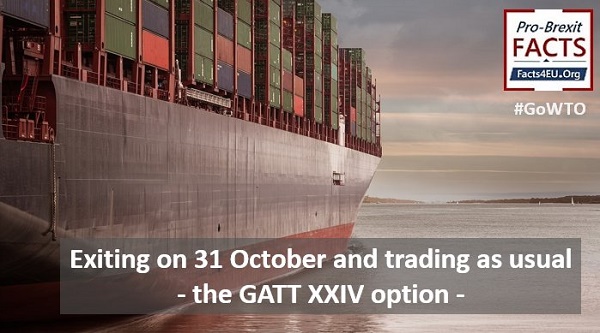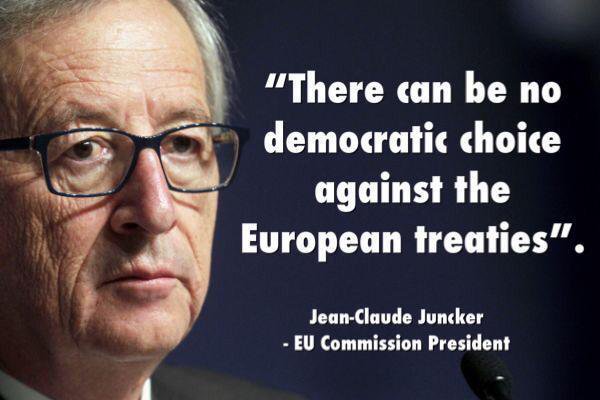Exiting on 31 October and trading as usual – the GATT XXIV option
Part One of a Brexit Facts4EU.Org explainer

© Brexit Facts4EU.Org
Boris is quite right about a GATT XXIV tariff-free trading arrangement with the EU
Readers will have heard ‘GATT XXIV (24)’ being mentioned by Boris Johnson in recent days. Remain campaigners have ridiculed this. Here we debunk their myths and mis-truths about GATT XXIV and explain what it could mean for post-Brexit trade with the EU.
Put simply, GATT XXIV is a mechanism for the EU27 countries and the UK to continue to trade without tariffs, whilst they negotiate a full Free Trade Agreement.
Brexit Facts4EU.org Summary
GATT XXIV and continuing tariff-free trade
- GATT XXIV is legal, and compliant with WTO rules
- It permits the EU27 and UK to continue trading tariff-free after 31 Oct 2019
- It is relatively quick and simple to implement
- It applies to goods trade – there are no tariffs on services anyway
- It could easily be in place by 31 Oct, provided both sides agree
Firstly, a little background
The rules of world trade are defined for 164 countries by the World Trade Organisation, of which the United Kingdom was a founder member in 1995. At that stage, the European Union was not a member in its own right, as it had not yet taken over trade as an ‘exclusive competence’ from its member states.
“In brief, the World Trade Organization (WTO) is the only international organization dealing with the global rules of trade. Its main function is to ensure that trade flows as smoothly, predictably and freely as possible.”
The UK was one of the key founders in 1948 of the precursor to the WTO known as GATT, or the General Agreements on Tariffs and Trade. In 1995 GATT was effectively made into a formal organisation which was named the WTO. It began with the 128 countries who had signed up to the last round of GATT trade negotiations.
A basic principle of the WTO is that a country must offer the same tariffs to all countries, known as most-favoured-nation (MFN) status, unless it has negotiated a free trade agreement with a particular trading partner or unless it is part of a customs union. There is also third possibility, which we shall come on to.
The EU Customs Union and the United Kingdom
As an EU member, the UK is part of a tariff-free Customs Union which encompasses all 28 member states. Put simply, if German car manufacturer Audi wishes to sell a car in the UK, it can do so without the UK applying any tariffs. However when Audi exports a car to the USA, tariffs will be applied by the US government.
The UK is in a Customs Union with Germany, the USA is not, so different arrangements apply and these are legal under WTO rules because the UK is in a customs union.
When the UK leaves the EU it will no longer be part of the Customs Union - unless Mrs May’s surrender treaty is agreed to, in which case the UK would stay in the Customs Union, Single Market, and almost all other aspects of EU membership. If the UK is no longer part of the EU’s Customs Union it would have to charge Audi the same tariff rate that it applies to cars originating from outside the EU.
This is where ‘GATT XXIV’ comes in
We have already stated that zero tariffs can apply if the exporting country is in a customs union with the importing country, or if the two countries have a free trade agreement which they have lodged with the WTO.
There is, however, a third way.
In simple terms, the provisions of the GATT XXIV clause states that two countries can trade freely without tariffs if they are negotiating a free trade deal. This is in recognition of the fact that it takes time to negotiate free trade agreements.
The proviso is that the two countries (for this purpose the EU is regarded as a country) must register this free trade negotiation with the WTO, and that it cannot be a permanent arrangement. In its latest interpretation the WTO has suggested that this should not exceed 10 years.
It is also of course a condition that both countries sign the GATT XXIV application.
So if the EU and UK sign a provisional Free Trade Agreement under article XXIV,
and lodge this with the WTO,
they can continue to trade without tariffs after 31 October 2019.
What would this GATT XXIV agreement look like?
The respected Cambridge academic Lorand Bartels has produced an example of the proposed GATT XXIV agreement. The template is just one page long.
So what’s the problem?
In two words, political ideologues.
It might seem perfectly natural that the EU would wish to continue its highly lucrative trade with the UK after the UK has left on 31 October. This trade earned the EU27 countries £96 billion NET last year and their exports of goods to the UK totalled £269 billion.
Despite the economic imperative for the EU, it has always been our opinion that the EU would never do a sensible deal with the UK because of politics. (See 'Observations' below.)
Our editorial position has been vindicated by the actions of the EU since the day after the Referendum, when Jean-Claude Juncker announced:
“This will not be an amicable divorce.”

Would the WTO agree to GATT XXIV?
The WTO is deeply concerned about the direction of world trade. In their 2019 annual report they cite the growth rate falling from 4.6% in 2017 to a projected 2.6% this year. That’s a 43% drop in the rate of growth in world trade.
At a time like this, we believe they would welcome a GATT XXIV proposed FTA between the UK and the EU with open arms.
Post-Brexit trade - MENU
Observations
If the EU were sane and rational, and cared about the jobs and prosperity of its citizens, it would agree to a GATT XXIV application in order to see tariff-free trade continue.
We do not believe that the EU will agree to a GATT XXIV free trade agreement negotiation lodged with the WTO, for purely political and vindictive reasons.
So why is Boris right about GATT XXIV?
Boris is right. The UK government should most certainly propose a GATT XXIV arrangement with the EU. When the EU declines, the rest of the world will find it hard to understand why.
In all of the Brexit negotiations to date, we have urged the Government to take account of world opinion. Sadly they have not done so. The PR battle has been won by the EU. The reason for this of course is that the UK Government under Theresa May and her Remainer civil servants have spent three years trying to keep the UK effectively inside the EU.
By proclaiming loudly under a new Prime Minister that the UK will leave on 31 October 2019 and is happy to see tariff-free trade continue with the EU – despite the enormous trade gap in the EU’s favour – the UK takes the high moral ground.
The only arguments the EU can have will be driven by their political fanaticism, and the World will then start to see the European Union for what it is.
Any chance of keeping us going? We rely 100% on donations from people like you. Unlike some Remain organisations - and some Brexit organisations - we don't have rich backers. If you could possibly help to see us into the final stretch, after more than three years of researching and publishing 7 days-a-week without a break, quick and simple donation methods are below. We reply to everyone and we respect your privacy. Thank you.
[ Sources: WTO | Dr Lorand Bartels, Reader in International Law, Fellow of Trinity Hall, Cambridge ] Politicians and journalists can contact us for details, as ever.
Brexit Facts4EU.Org, 29 Jun 2019
Click here to go to our news headlines
And please scroll down for comments on the above article.
Since before the EU Referendum, Brexit Facts4EU.Org
has been the most prolific researcher and publisher of Brexit facts in the world.
Supported by MPs, MEPs, & other groups, our work has impact.
We think facts matter. Please donate today, so that we can continue to ensure a clean Brexit is finally delivered.
Paypal Users Only - Choose amount first
Quick One-off
Monthly


Something to say about this? Scroll down for reader comments